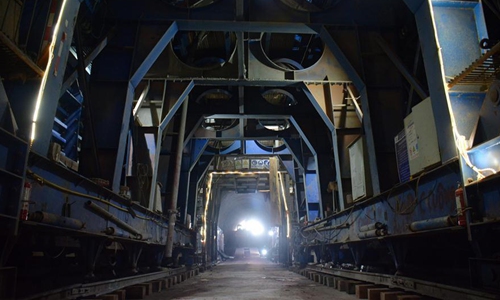HOME >> CHINA
China-Laos railway's longest tunnel holed
Source:Xinhua Published: 2019/12/27 14:32:04

Photo taken on Dec. 13, 2017 shows Ban Somsanook No.2 Tunnel in Vientiane province, Laos. Ban Somsanook No.2 Tunnel holing-through on Tuesday became the first holing-through tunnel of the China-Laos railway project. Photo: Xinhua
China-Laos railway tunnels' construction has made a decisive breakthrough, with its longest tunnel drilled through on Friday morning in the tropical mountains of northern Laos.
Seven months ahead of the planned timetable, the Chinese engineering companies, namely PowerChina Sinohydro Bureau 3 Co., LTD (Sinohydro 3) and Sinohydro 14, on Friday bored the 9,384-meter-long Ban Sen No.2 Tunnel, south to the ancient Lao capital of Luang Prabang, some 170 km north of capital Vientiane.
This marks an important milestone in the construction of the China-Laos railway, as the engineering work enters the ending-up phase, and the railing work and construction of the railway stations are soon to be kicked off.
The Ban Sen No. 2 Tunnel crosses the provincial border of Luang Prabang and Vientiane in the tropical mountains, with steep terrain, complex geology, abundant groundwater, and difficult construction and transportation conditions.
Since the start of the tunnel construction in March, 2017, the Chinese project contractors, Sinohydro 3 and Sinohydro 14, have strictly implemented the requirements on mechanization, factoryzation, informationization, and professional management, strengthened the on-site safety and quality control, widely used full-set tunnel construction techniques and equipments, vigorously carried out scientific and technological research, actively promoted the application of the new technologies, and paid close attention to process management so as to ensure high quality and safety in construction.
The Chinese engineering teams once made the China-Laos railway tunnel construction a record in Ban Sen No. 2 Tunnel, with 245.8-meter-long tunnel bored in a month, laying a solid foundation for Friday's completion.
According to a mobilizing meeting for the dry season's work held in Vientiane in October, by the Laos-China Railway Co. Ltd (LCRC), which is in charge of the railway's construction and operation project, 79 percent of the civil engineering work contract volume has been completed till then, while breakthroughs have been made in lots of key and bottle-neck projects, especially for the tunnel construction.
The China-Laos railway has holed through around 50 tunnels so far out of its 76 tunnels with a total length of 198 km.
The Boten Tunnel, the first major tunnel over 5,000 meters along the China-Laos railway, was drilled through on March 21, 2019 by China Railway No. 5 Engineering Group (CREC-5). In October, 2018, CREC-5 also completed the first over-1,000-meter tunnel along the China-Laos railway, the Nateuy No. 1 Tunnel with a length of 1,158 meters, some 360 km north of Vientiane.
In February 2018, the Chinse engineering companies started inside-tunnel construction for all major tunnels along the China-Laos railway, and started construction of all over-one-kilometer tunnels.
In December 2017, Ban Somsanook No. 2 Tunnel with a length of 301 meters in Laos' Vientiane Province, was bored by the Chinese project contractor Sinohydro 15, and became the first completed tunnel along the China-Laos railway, and the first road and railway tunnel in the Lao history.
The China-Laos Railway is a strategic docking project between the China-proposed Belt and Road Initiative and Laos' strategy to convert from a landlocked country to a land-linked hub. The 414.332-km railway, with 198-km tunnels and 62-km bridges, will run from Boten border gate in northern Laos, bordering China, to Vientiane with an operating speed of 160 km per hour.
The electrified passenger and cargo railway is built with the full application of Chinese management and technical standards.
The project started in December 2016 and is scheduled to be completed and open to traffic in December 2021.
Posted in: DIPLOMACY,CHINA FOCUS